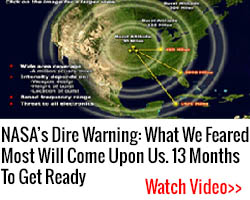“This is How You Have to Think About Escalation and End Games”
There is no doubt that the U.S. military has the ability to engage any foreign enemy and leave it dismantled or utterly destroyed. This is one of the key reasons for why Russia and China have thus far remained on the sidelines as it relates to direct military conflict.
But according to one intelligence insider, though our country is unmatched on the traditional battlefield, a strike on the United States could come in the form of coordinated asymmetric attacks that would significantly level the playing field and lay waste to life as we know it in modern-day America.
Jim Rickards, author of The Death of Money, knows a thing or two about how foreign governments are approaching the question of America’s global hegemony. He has worked closely with U.S. intelligence agencies for decades and in 2007 was the operational director of the country’s first ever financial war games. According to Rickards, don’t expect our foreign enemies to be firing missiles at major cities any time soon. If an attack is to come to our shores it won’t come in the form of bombs and bullets. At least not at first.
In this absolutely must-watch interview with Future Money Trends, Jim Rickards delves into scenarios that will change the very face of our world over the next decade. He explains the complexities involving the various geo-strategies currently at play and provides a realistic view of the escalations we can expect to occur going forward as East and West face off on the globally inter-connected battlefield of the early 21st century.
There’s not a country in the world that can stand up to the United States in what’s called kinetic military warfare. So kinetic just means things that shoot or explode. So missiles, bombs, submarines, airplanes, etc., nobody can go toe to toe with the United States. We can sink any navy, ground any force, disrupt any control communications system anywhere in the world.
So nobody wants to confront the U.S. in that space.
But when you move over to what we call asymmetric warfare, or unrestricted warfare, what is that? That includes things like cyber warfare, financial warfare, weapons of mass destruction, chemical, biological, radiological weapons, those types of things. It’s a much more level playing field.
Now the U.S is very good at it, don’t get me wrong, but so are others. And there it’s much more evenly matched.
I say the Russians could use their hackers to shut down the New York Stock Exchange, which they could. And one rebuttal I’ve heard as well, is that U.S hackers could shut down the Moscow Stock Exchange. And my answer is of course they could, but who wins? In other words, we have a lot more to lose than they do. They shut down our stock exchange, we shut down their stock exchange, they win because we have a much more important exchange there. Who cares about the Moscow Stock Exchange?
So this is how you have to think about escalation and end games, and what technically what we would call the game theoretic context within which this is playing out. I’m not sure the U.S is very good at that. I mean the U.S is very good at these kinds of financial warfare. I’m not sure they’re very good at the kind of geo-strategic and theoretic thinking that I’m describing to your listeners.
Right now the United States is actively conducting financial warfare against Russia. As Jim notes in the above interview, we have begun seizing the assets of Russian officials and are working to implement sanctions on the global level. Vladimir Putin may not be planning to launch nuclear strikes at U.S. cities as a result, but what if the Obama administration crosses a line that shouldn’t be crossed? Could Putin launch a counter attack in the cyber world? Perhaps, as noted by Rickards, he would give the order to take down our stock exchanges, a move that would wreak havoc across the entire world.
Former Homeland Security secretary Janet Napolitano has warned that a cyber attack on the U.S. power grid or utility infrastructure is inevitable. Sure, it could be instigated by rogue hackers, but for widespread success in such a scenario it will likely come in the form of a state sponsored asymmetric attack that may also involve other non-kinetic means.
The fall out would be disastrous. But more frightening than that is the question of how our country would respond. What would be the next level of escalation?
During the cold war there existed a principle of Mutually Assured Destruction (MAD). The idea was that if they fired their missiles, we would fire our missiles. The threat of widespread destruction kept thermo-nuclear warfare at bay for three decades. There were most assuredly escalations even then. We came close to all out war with the Soviet Union on at least two occasions, but everyone understood what it meant.
As Rickards explains, today we have a similar principle but it seems that Obama administration officials haven’t yet grasped its implications:
Today what we have is mutually-assured financial destruction. So the U.S. can absolutely use financial weapons against Russia, there’s a lot of things we can do. But if we do anything beyond tokens, a token would be some Oligarch doesn’t get to go to the Super bowl, or you freeze the assets of some minor, mid-level guy who doesn’t have any assets, those are token sanctions.
But if you deliver these serious sanctions, you can expect Russia to escalate. Now initially, I thought the U.S. would understand this construct, this theoretic construct, of escalation, further escalation, ultimate mutually-assured financial destruction, and not go very far. But this morning, as we speak, the U.S. has announced sanctions against Igor Sechin.
That’s serious, he’s the real deal. So now my expectation, using the frame-work I described, is that Russia will strike back in some way.
Within the framework described by Jim Rickards we can expect this back and forth to continue. We’re seeing it play out in real time.
The United States was deeply involved in the Ukrainian revolution from the outset. Moscow, not one to take things lying down as the west moved in on a former Soviet Satellite, responded by deploying over 100,000 troops to the border and annexing Crimea. The U.S. subsequently moved to implement financial sanctions against Russia’s top political leaders and are reportedly looking into the personal assets of President Putin himself. The Chinese jumped into the fray by voicing their support for Russia through coming monetary changes and warned that these sanctions could well backfire against the United States. A few days later, President Obama deployed US troops to Poland and other NATO allies. Now, as we learned this week, Russian strategic bombers are making fly-by’s along our West Coast.
Slowly but surely this conflict is escalating.
What comes next is anybody’s guess, but we’re hardpressed to find any scenario in which the United States or Russia de-escalate the tension.
Over coming weeks, months and years we should fully expect a continued escalation, eventually culminating in physical warfare.
Also from Future Money Trends: Hyperinflation and Unsustainable Debt Obligations
Other useful resources:
Survival MD (Best Post Collapse First Aid Survival Guide Ever)
Backyard Innovator (A Self Sustaining Source Of Fresh Meat,Vegetables And Clean Drinking Water)
Blackout USA (EMP survival and preparedness)
Conquering the coming collapse (Financial advice and preparedness )
Liberty Generator (Build and make your own energy source)
Backyard Liberty (Easy and cheap DIY Aquaponic system to grow your organic and living food bank)
Bullet Proof Home (A Prepper’s Guide in Safeguarding a Home )
Family Self Defense (Best Self Defense Strategies For You And Your Family)
Sold Out After Crisis (Best 37 Items To Hoard For A Long Term Crisis)
by Mac Slavo of www.SHTFplan.com.



